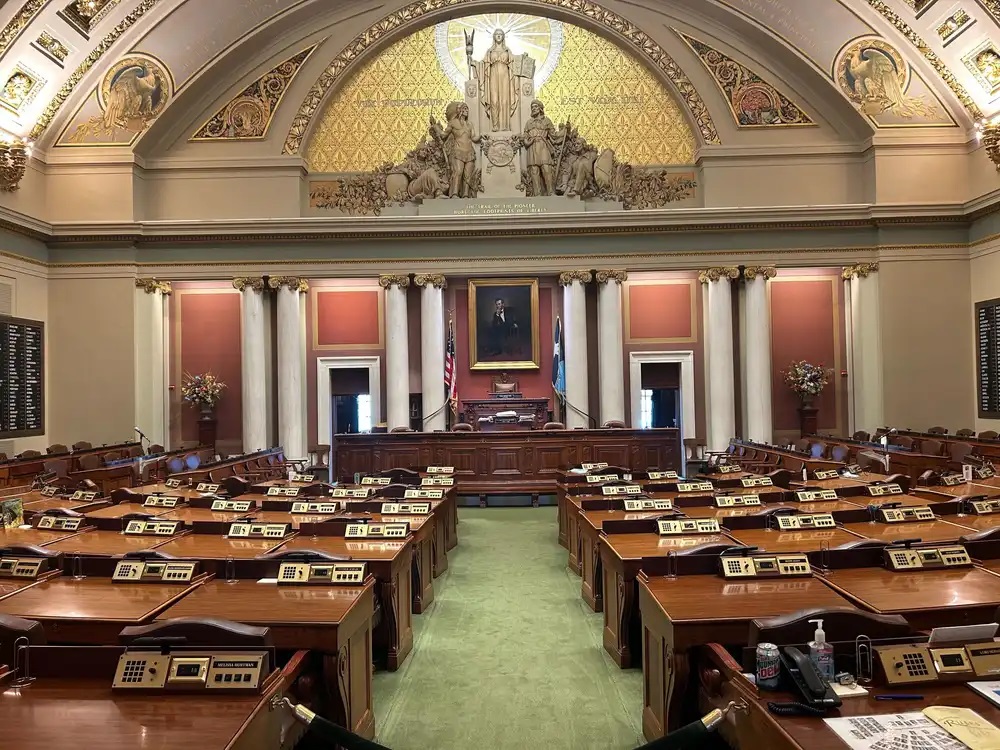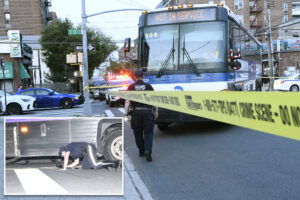
Already behind schedule, Minnesota lawmakers aim to complete a new state budget this week and head off the possibility of a government shutdown a month from now.
The final pieces of budget legislation are coming into focus. Once the last details are locked in, Gov. Tim Walz intends to call a special session. He told MPR News last week that he was aiming for Wednesday, but that could easily slip until later in the week.
The Legislature failed to complete much of the $66 billion two-year budget by a May 19 session adjournment deadline. Since then, small sets of negotiators have met mostly behind closed doors. That’s meant stakeholders and the public in general have had to scrape for details.
And for some lawmakers on the inside, they add that the process has been difficult for them as well.
“It was very difficult,” said Rep. Erin Koegel, a DFLer who helped fashion a final transportation plan. “There’s lots of egos, and it was a very hard process. It was uncomfortable and it was tense. And I’m hoping that maybe some lessons were learned this year, and we can go forward in a little bit more of a civil manner.”
The Republican co-chair of the House Taxes Committee told MPR News on Monday that he doesn’t think the proposal structured by Walz advisers and legislative leaders can pass.
“We put five months of thought into something they put five minutes of thought into, and I know which one’s going to be better,” said Rep. Greg Davids, of Preston. “I’m just not sure why any Republican would even consider voting for this. I don’t think it would pass the House or the Senate.”
What’s unusual about the Capitol now is that the House is tied between Democrats and Republicans. The working groups are chaired by three lawmakers — a Democrat from the Senate and House and a Republican from the House.
The legislation they’re writing will be voted on in public during that yet-scheduled special session.
Legislative leaders are hoping for an in-and-out session that takes one day or close to that.
But this year has been full of surprises, and it wouldn’t be a shock if lawmakers unhappy with the agreements drag it out to make a point or try to send things back to the bargaining table.
Plans available online
Most budget spreadsheets and policy agreements are online, although a few bill drafts are still to come.
An education finance bill popped up Monday. A tax bill was posted over the weekend.
The tax bill is 12 pages in total, meaning most items in dispute were tossed overboard. It’s a sharp contrast to last year’s tax package, which ran more than 1,400 pages and has attracted lawsuits for the inclusion of so many items that only loosely connect to the tax code.
The transportation plan Koegel worked on reflects a $115 million cut in the next two years and a bit more than that two years beyond that. The Spring Lake Park DFLer said her goal was to minimize cuts to mass transit.
But there were other pinch points that kept the transportation bill open for weeks, from discussions about emissions to the structure of mass transit.
As part of the agreement, electric vehicle owners will foot more of the transportation bill. EV owners will pay a surcharge to basically kick in money they’re not paying in gas taxes. Initially, that had been a flat amount. The final plan determines the surcharge based on a formula that factors in vehicle value and age.
The minimum fee at first will be $150 for full-electric cars and $75 for plug-in hybrids. But that could shift later as lawmakers study a charging system fee.
Some higher taxes
The “skinny” tax bill tapers exemptions for data centers. They won’t be able to avoid taxes on electricity use as they have before.
The cannabis products tax goes up from 10% to 15%.
Davids said the fact that it raises taxes overall is a nonstarter for him.
“It’s massive tax increases, and that’s not what our caucus is supposed to be about,” he said.
In the education bill — at more than $25 billion, it’s one of the biggest expenses in the state budget — there are changes to calculations for various per-student allowances. The bill includes more money to implement literacy curriculum changes.
There’s also a new task force set up to examine special education costs and look for ways to lower the rapid growth in those.
Districts will be expected to develop and implement cardiac emergency response plans for sudden cardiac events on their properties; those would have to be in place by the 2026-27 school year, and there is grant money in the bill to aid with the anticipated costs.
Individual bill fates unknown
Aside from when this special session will happen, it’s difficult to assess if there will be enough votes to pass all these bills.
The 67-67 House creates an unusual dynamic, and a 34-33 Senate led by DFLers doesn’t leave much room for defections either.
The risk of a partial government shutdown and state employee layoffs next month remains for areas without enacted budgets. Layoff notices have started to go out to meet legal requirements for workers who could be furloughed.
As some remote-work employees start shifting back to office assignments under a Walz directive, state employee union leaders say the one-two punch is a lot to handle.
Leaders of the Minnesota Association of Professional Employees wrote in a memo to rank-and-file members late last week under a bolded heading of “Facing next week might feel scary.”
“We know these coming days will be hard,” it reads. “The people running the state didn’t give you the respect of a plan, but we’ll make sure you’re not left in the dark. You keep Minnesota running.”



